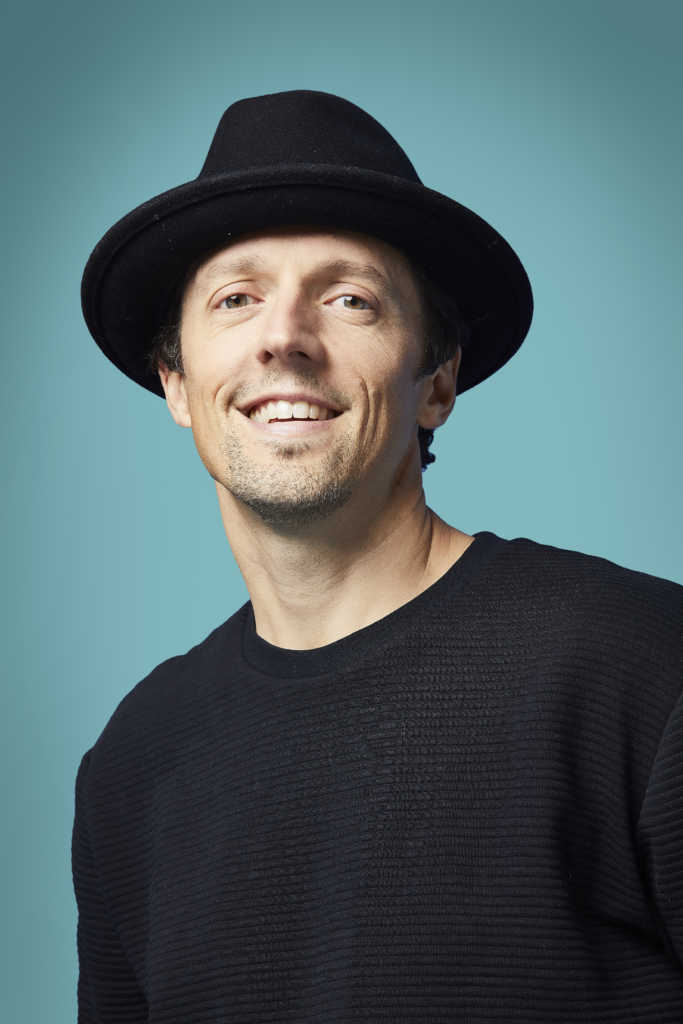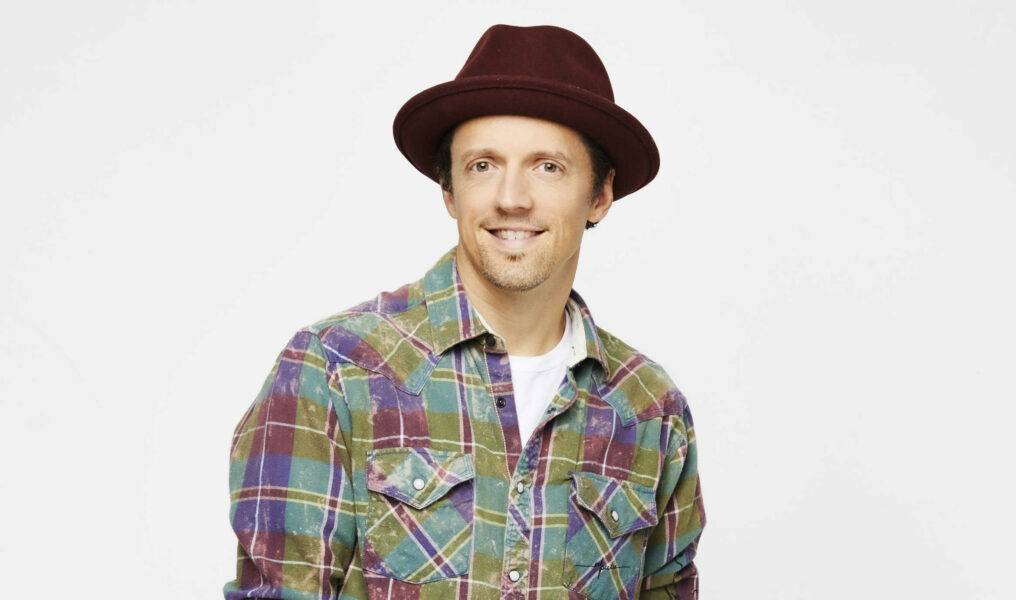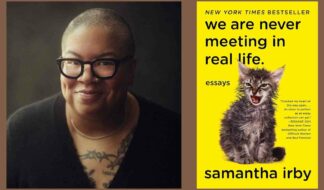The coronavirus pandemic has forced Pride events around the world to go virtual this year. For Jason Mraz, that means he can, for the first time, take part in the annual summer festivities. After all, thanks to the virus, the "I'm Yours" singer-songwriter can't tour in support of his latest album "Look for the Good." Usually, he says, he's on the road during Pride season.
"I've got friends and neighbors who invite me every year, but my schedule never allowed it," Mraz says during our recent Zoom call. This summer, he says, he's "probably gonna hole up with my friends and neighbors and do the virtual Pride event and go hard."
From his home studio in San Diego, Mraz, 42, discussed his side hustle – food agriculture – as a metaphor for the fight for racial and LGBTQ justice, how Mister Rogers inspired his latest album, why he's thanking his childhood bullies who used to call him a "fag," and his journey to being openly bisexual.
Jason, how are you and your family doing? And the avocado farm?
I'm fine. I'm a bit of an empath, so yeah (gets choked up) … feeling pretty terrible about what's going on. I've tried to use my superpowers for good. I've tried to sing songs of hope and positivity and peace and joy. So, you know, thinking about how I'm going to keep singing and breathing life into a better future. We have a little apricot tree, which for the first time is producing fruits. It really is a pleasure and a privilege to work in food production and to work with the Earth and to have that level of peace, and that interaction with nature.
I once read that one of the best things to do is to go outside and just lay on the ground. Just feel the Earth underneath you.
So nice. I think one of the best things to do is just lay down in general, which I always forget. I'm always on my feet. I'm always going, going, going. A cool thing I like to do when I lay down on the Earth, especially at night, is remember that we're not necessarily sitting on top of the globe; we're kind of stuck to perhaps the side of it, or depending on how it's photographed, maybe we're on the bottom of it. Who's to say the poles are really on top and bottom? We're floating in a vacuum of space. There's really no up or down. So when I'm laying on the side of the Earth, I like to imagine I'm on the side of it, just dangling. And if you put your feet up, you're really dangling out into the universe, which is this big vast ball of confusion. It's a good thing.
I know right now is not really the time to lay down and be quiet and look at the stars, but let's talk about food for just one second. You can't grow food overnight. It takes time and it takes rest, it takes daylight and it takes darkness; it takes the earth to regenerate and renew itself. That said, everyone who's out there fighting for justice right now, also remember to stay hydrated and get good sleep and stay rested so that a season of this can continue and real transformation and regeneration can occur.
They say that if you're not taking care of yourself, you can't take care of other people.
That's right. The flight attendants tried to teach us well. Secure your oxygen mask first before securing others. But, nowadays, careful how you even say that, because there's been plenty of people who never even had an oxygen mask to begin with. So here we are in a whole new educational America.
There really couldn't be a better time for this album. You couldn't have predicted that this is where we would be, and yet it feels like this album could have come out of this very moment. Can you talk about your headspace when you decided to write this music and how relevant it is to what we're going through right now?
In 2016, after the election that year, my heart exploded and I started writing different kinds of songs. I knew that 2020 was going to be another engaged election year, so last year I just started putting all this together. I teamed up with Michael Goldwasser of (reggae collective) All-Stars – he's a phenomenal reggae producer – and we put a phenomenal band together. We thought, "The sound of reggae and all the different genres inside of it are so danceable and also beloved around the world; let's make a full album of reggae tracks and at the same time let's try to breathe life into some issues we care about through these songs and lyrics and offer it to the world in 2020 because we know it's gonna be heated, we know there's gonna be debates, we know there needs to be radical change and recognition for many." We, of course, didn't predict this level of radical change. But I'm glad to see an uprising. I really am.
I'm not an anarchist, but I am glad to see America getting its education and an invitation for new ways to mobilize, strategize, react, use our resources, use our powers. So "Look for the Good" was intended to be that. It was intended to be this little album of songs that are easy to dance or march to, to remember to stay positive while you're out there using your voice or your time for the greater good.

With everything feeling so heavy right now, where do you find the good?
Well, if I'm not on the internet (laughs), I'm at my piano, usually. And it's kind of a new instrument for me. It has a different voice, it has a different weight. So that's been my peace. That's been my little church.
And then on the internet, I go for peace. I follow (civil rights activist) Shaun King and the NAACP and I just want to educate myself more on how I can better use my internet resources. I feel like the battlefield for a more equal and just America is not (only) on the streets, it's also on the internet. Because we've clearly seen propaganda come our way to heighten our president and those initiatives, but we also need the propaganda or the internet content and bravery and songs and sharing to heighten the injustices and to advance equality.
Here's something interesting: about 10 years ago I took a trip to Ghana and I got to visit "the door of no return," which is what they would call the door that slaves were passed through; if they went through that door they were going to be boarded onto a slave ship and exported out of Africa to either London or the United States. It was an intense place. But the thing that helped abolish slavery was the printing press. This blew my mind. A printing press. Because suddenly now we've got newspapers and we can make more people aware of what a slave ship looked like, what humans look like stacked in a boat, and how harsh the conditions are. And it started to touch people's hearts. And eventually people said, "Enough is enough. Why are we doing this to other human beings?"
So we are experiencing the same thing right now with the level of communication that we have, the many cameras and eyeballs and engaged people we have. We have all these microprinting presses all over the planet exposing the harsh realities and brutalities that people of color and (the) LGBT community as well have experienced. This type of hatred and bigotry. So I feel like this is a huge awakening. There's a huge new printing press. Sorry. Your original question: What am I doing to look for the good…
Yeah, you said you're at the piano, making some music and writing some songs.
That's really where my best spirit is enjoyed is at the piano because I can transmute my fear and my pain into something more pleasant. Our life experience is going to be the result of our thoughts and our speech, our beliefs and our actions and our attitudes. I feel that music – and art in general – is such a great way to access and get all five under control: your thoughts, your speech, beliefs, your actions, your attitude. Then your life experience gets completely transformed and gets basically connected to that big planet that we're dangling on, and that universe that we're praying to and wondering, "What the eff is this all about?" Beliefs that we can truly live in a beautiful, beautiful, beautiful, peaceful world. All of that can come together through music.
I think music has the power to get through to people when other means of communication cannot. Do you recognize that as a musician?
It's not as easy to memorize a quote, but what is it about a melody that allows it to sink and stay with us? I don't know the science behind it, but I've been experimenting with it since I was a little kid and it's a magical phenomenon that we as humans get to experience. It's a language that transcends the words even. And it's a human phenomenon. And I'm so thankful that it exists. Imagine if we only had to deal with speeches. That would be a miserable existence.
What does the rainbow on the cover of "Look for the Good" represent?
I got this idea from a Mister Rogers album cover. He has an album that says "Mister Rogers knows you're special" and it has a little mirror on the cover and also a little rainbow around it. I was really touched by that, and I was really touched by his work. And even the song "Look for the Good" is a bit of a reference to an interview I saw with him. I guess it was his mother who told him, when watching the news, if something bad is on the news, look for the heroes. Look for what's good on the news. And that inspired the songs. That inspired the album cover. Really it inspired who I am as an entertainer. So the album cover was really meant to be a reflection back on the viewer to see the good in themselves.
We've had some phone interviews in the past, and I've sort of seen you come fully into yourself.
(Smiles.) Getting there.
The journey of you being an out public figure took some time. I was looking back at some of our conversations and you dropped a couple of hints. In 2010, you told me you didn't like feeling another man's facial hair on your skin. And then in 2012, you said you'd been asked to join in on a threesome with a couple but it wasn't a reality at that point. And then, in 2018, we got the news that you were bisexual (via a Pride Month poem Mraz wrote for Billboard). Why, at that moment, did it seem like the right time to come out as bisexual?
I wanted to be careful (because of) my family, which is probably a struggle a lot of people have. And when I say this, it's not because they wouldn't love me for who I am. I was afraid to say who I was when I was younger. I was afraid to explore it because I thought exploring it was the wrong thing to do because of things I heard when I was growing up and because of how I saw society react to the LGBT community. So I thought if I go down this lane, I was taught that it was not a good path. And so for me to come out and say I was taught that that's not a good path is potentially causing harm to my mother who raised me well, so I never wanted to put her in a position that made her feel or look like a bad parent. Same to my stepfather or my stepmother or my father. I had four parents. They're not all to blame. I'm not going to throw any of them under the bus.
So it was just growing up in a kind of community where I didn't feel safe to go down that path and explore some intuitions that I had. So I closeted it. I suppressed it. I put it aside. And as I go through life, and as I started having experiences, it's in my programming, it's the systemic issues of going through life and thinking, "This is not healthy." But the more I went through life and the more I became supported and supportive of the LGBT (community), I realized I was safe, I was home, and enough is enough.
Silence doesn't do anybody any good. And it wasn't doing me any good. It wasn't giving me the opportunity to have more of the experiences I wanted to have in my life. And as I was getting older, I thought, "Jesus, am I gonna waste my whole life on fear? Or can I step into this and be proud of who I am and see where this takes me, see where this journey takes me, see what kind of new friendships I form, see the level of love that I'm capable of that I've not given myself permission for?" That was my journey.
Honestly, I thought, "I'm gonna have to wait until my parents leave the planet before I get to be who I am." I didn't want that. I wanted them to see who I am while they're still alive and I want to be who I am while I'm still alive. It gave me even more empathy and more compassion for those who are taking that journey every day, and for the out community who just lives bravely in this world every day. So it was time for me to come out. If I was really going to use my superpower for good, it was time for me to start addressing who I am, because authenticity is the new reality.
Thank you for sharing that. It takes me to the last song on the album, "Gratitude." I don't think I've ever thought to give gratitude to the bullies who called me a faggot when I was a kid, which you do on the song. Can you talk about how that song came about and how you were able to get to a place where you could show gratitude to the people who ridiculed and put you down as a kid?
I can't fight violence with violence, and I can't just call names back to the people who've called me names. So rather than name-calling, I tried to look for the good in the situations that I experienced in high school.
I didn't want to go back and attack that person. I just wanted to demonstrate that I was better than that person and that all that energy they put into tearing me down was a waste of their energy because all I've done is build myself up to be a bigger, better, stronger, more active person. I've known that for a long time I did want to put that in song, so I started this song back in 2010. I played it live a few times, but it never really found its home on an album.
So finally on this album, working with this phenomenal reggae band and having 10 years to really build the song, (and) I listened to a lot of gospel music, especially on Sundays, I was able to weave some of my gospel influences into this song "Gratitude" and do my best to try to look for the good.
That's what this album project was. How can I look for the good in this? How can I look for the good in 2020? How can I look for the good in my past? And I knew I needed to figure out: How can I look for the good in the trauma of my high school bullies? And if I can, it's that drive; they gave me that drive. And I hope that they're embarrassed or sorry or feel like total failures because their bullying did nothing but help me change the world.
My last question is Pride-related. What message do you want to send out to the LGBTQ community? Because Pride is different this year. We're going virtual. A lot has changed.
Just because it's going virtual does not mean that Pride is still not a protest. And the battlefield is not just on the streets, it's on the internet; it's amplified when our voices come together. So my message to people this year is to keep going and go harder than ever. I honestly feel like what's going on in the world is getting closer to the Equal Rights Amendment and that's been a long time coming. The last time the Constitution was amended and ratified was in the '90s and it had to do with Congress' salaries. Who gives a fuck about that? So I think what's really heating up is going to get us closer to the Equal Rights Amendment. So my message to Pride is, even though we may not be in the streets, go harder than ever. And who knows? This thing might spill over into the streets anyway because the internet can't hold us. It can't.
This interview has been condensed and edited for clarity.











